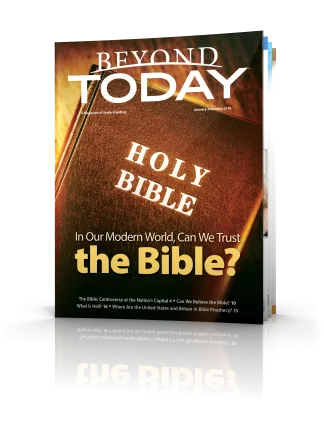Follow Me: “Amen. Even So, Come, Lord Jesus.”

Recalling our journey through the garden settings of Scripture, do we deeply desire a close relationship with the Father and Christ now and forever?
Over this column’s last three entries we have traveled through three unique garden settings from Genesis to Revelation, all systematically designed to highlight God’s ageless desire: “I will set My sanctuary [or set-apart place] in their midst forevermore. My tabernacle [or dwelling] also shall be with them; indeed I will be their God, and they shall be My people” (Ezekiel 37:26-27; compare Revelation 21:3).
God’s initial intention from the first Adam in the Garden of Eden to the second Adam, Christ, in the Garden of Gethsemane, to the eternal garden setting in Revelation 22 is seamless: He desires a personal relationship with His special creation—and that includes you!
Last time, as we explored the ultimate garden-like setting of the New Jerusalem come down from above (Revelation 21-22) with God and the Lamb’s presence front and center, I left you with the invitation to embrace the reality that eternity isn’t simply a destination, but a way of traveling forever in heeding Christ’s call of “Follow Me.” Let’s continue, then.
With all the highs and lows described in the book of Revelation—the persecution of the Church, the rise and fall of Satan-led empires, God’s just judgment on a world gone astray, and the garden setting of the New Jerusalem—the apostle John was inspired to write: “And the Spirit and the bride [the Church] say, ‘Come!’ And let him who hears say, ‘Come!’ And let him who thirsts come. Whoever desires, let him take the water of life freely” (Revelation 22:17).
The living Christ declares, “Surely I am coming quickly” (Revelation 22:20). To which John yearningly responds: “Amen. Even so, come, Lord Jesus!” (same verse).
Do we echo the same sentiment? Do we really want Christ to come? Not only in the future as promised, but living out that desire in our lives now as we anticipate existing with Him and the Father one day in that final garden of eternity? And how do we, to quote leadership expert Stephen Covey, “begin with the end in mind”—every day in every way?
Must show desire for Christ and the Father to come
The first two lines of the model prayer Jesus Christ taught to His disciples, referred to as “the Lord’s Prayer,” offer a key. Consider that the following words show both reverence and expectation: “Our Father in heaven, hallowed [or treated as holy] be your name, Your kingdom come, Your will be done on earth as it is in heaven” (Matthew 6:9, emphasis added throughout).
Many of us have sincerely recited these lines in times of dire circumstances. Yet how does our Heavenly Father above know such entreaty is not merely a last resort of frustration, rather than the starting point of our existence every day? Talk is cheap. Our witness is shallow if we are not living our prayers now.
When we appear before Jesus at His return, His first question isn’t going to be about what we knew, but about what we did with what we knew! Knowledge is of no value unless you put it into action! Jesus bluntly stated, “Not everyone who says to Me, ‘Lord, Lord,’ shall enter the kingdom of heaven, but he who does the will of My Father in heaven” (Matthew 7:21).
When Christ says, “Follow Me,” and we accept that priceless invitation, He wants more than our talk. He wants us to walk the walk toward that eternal last garden—not merely as a destination, but a way of traveling here and now in the arena of choices we make every day.
Let’s break this down into three important aspects of demonstrating our desire for Christ and the Father to come to us every day and forever—requiring our total surrender and participation in that process.
In spirit and truth
We proclaim “Come” when we heed Christ’s words that God has called us to worship Him in spirit and truth: “But the hour is coming, and now is, when the true worshipers will worship the Father in spirit and truth; for the Father is seeking such to worship Him. God is Spirit, and those who worship Him must worship in spirit and truth” (John 4:23-24).
Three key concepts leap out of Jesus’ clear statements:
1. “The hour is . . . now,” not just later!
2. God looks at our inward motivations. He plainly states in Jeremiah 17:10: “I, the Lord, search the heart, I test the mind, even to give every man according to his ways, according to the fruit of his doings.”
3. Proper inward motivation in following the Father and Christ is not optional. It’s a must. Otherwise we are merely echoing the accent without a trace of the core language that God desires to be expressed from our hearts.
We therefore check and bring under examination not only what we are doing, but also why and for whom.
Let’s be honest. The greatest transmitter call letters in our world are W.I.I.F.M.—standing for “What’s In It For Me?” This is totally opposite from God’s modus operandi proclaimed by the apostle John towards the end of his spiritual journey: “Behold what manner of love the Father has bestowed on us, that we should be called children of God! Therefore the world does not know us, because it did not know Him” (1 John 3:1).
The difference is tangible—on open display toward God, ourselves and others—when we express God-like love toward others, having outgoing concern away from us with no strings attached. This must be our response to Jesus’ invitation to follow Him—exhibiting selflessness just like the One who “did not come to be served, but to serve” (Matthew 20:28).
Let’s appreciate that such love is not ethereal or out of our grasp—and that it leads us to the next step.
By our obedience
We proclaim “Come” and express desire that God’s will be done on earth as it is in heaven when we obey His law as defined by His commandments. These present God’s way of life in action.
As 1 John 5:2-3 tells us: “By this we know that we love the children of God, when we love God and keep His commandments. For this is the love of God, that we keep His commandments. And His commandments are not burdensome.”
God has never done away with His law, but He has firmly granted us the realization that keeping the law doesn’t save us. After we repent of breaking God’s laws, His grace, which includes forgiveness through faith in Christ’s sacrifice, does save us! (Ephesians 2:8). But we cannot be saved if we are not committed to obeying God’s laws, which are a reflection of His perfect mind and character. The law instructs us how to live before God and with our fellow man.
By God’s transcendent design, His law is ultimately spiritual in nature. As the apostle Paul writes, “For we know that the law is spiritual” (Romans 7:14). It’s no longer written by the finger of God on stone, but to those who surrender to Him He inscribes it their hearts, as He promises: “I will put My laws into their hearts, and in their minds I will write them” (Hebrews 10:16).
Is this a different script from the giving of the commandments in Exodus 20? No! The apostle James likewise wrote: “So speak and so do as those who will be judged by the law of liberty. For judgment is without mercy to the one who has shown no mercy. Mercy triumphs over judgment” (James 2:12-13).
What does this mean? How does mercy triumph over judgment? Mercy triumphs over judgment when we judge ourselves and repent of our sins—the transgressing of God’s law (1 John 3:4). Then, recognizing that we have been the recipients of God’s mercy and forgiveness, we show mercy and forgiveness toward others.
It’s an echo of Jesus’ prior teaching 30 years before when He stated regarding outward observance of the law not to neglect “the weightier matters of the law: justice and mercy and faith. These you ought to have done, without leaving the others undone” (Matthew 23:23).
Through the special life from God in us
We can only begin to proclaim “Come” and perform God’s will on earth as it is in heaven when we accept and abide with that special life from God that resides in us—by the Father and Christ living in us (John 14:23).
This is the only way to keep pressing forward. Let’s fully understand that this world is our tour of duty—one continuous assignment after another of waging spiritual warfare. Jesus prayed to our Father, “I do not pray that you should take them out of the world, but that You should keep them from the evil one” (John 17:15).
And we must remember that we are not alone in this. Jesus made a promise to His followers long ago on the night of His betrayal: “I will not leave you orphans. I will come to you” (John 14:18). Yet at times of darkness in our lives we can forget that promise.
That’s why the apostle Paul used a scriptural megaphone to blast the message not only into the ears and hearts of the church members in ancient Corinth, but to wake up all of us today to this reality as well: “Examine yourselves as to whether you are in the faith. Test yourselves. Do you not know yourselves, that Jesus Christ is in you . . . ?” (2 Corinthians 13:5). What a powerful homing device to draw upon toward guiding us to the ultimate eternal union with God the Father and Christ!
Yes, the same generous spiritual essence of the One who personally walked and talked to Adam and Eve in the first garden. Yes, the same obedient One who in the later garden called Gethsemane taught us to commit ourselves to move beyond our personal desires to express, “Not My will, but Yours, be done” (Luke 22:42).
We desire that God the Father and Christ come into our lives today in anticipation of Their later coming to dwell with us here for eternity.
The Old Testament patriarchs didn’t always know where God was leading them. They didn’t put their faith in knowing where X marks the spot, but towards the Lord who was guiding them. Isn’t that what the apostle John was expressing for all of us when He proclaimed, “Amen [so be it]. Even so, come, Lord Jesus!”
Until that day when we meet in that ultimate garden by the grace of God, let’s continue the journey to which we have been invited by the One who said to us, “Follow Me!”






